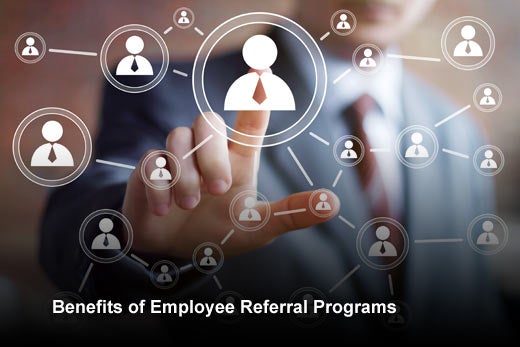Eighty-five percent of employers are expecting their companies’ hiring to increase or stay the same. At the same time, workers are staying in positions for shorter periods of time. By capitalizing on employee networks, companies can start addressing the need for increased hiring in today’s new era of talent acquisition.
In fact, companies already recognize the benefits of employee referrals. Organizations rank employee referrals as their most successful source of hires, above job boards, social networking sites and corporate career pages. Part of the reason employee referrals are ranked so successfully by employers is because they attract talent that benefits the bottom line.
In this slideshow, iCIMS, a leading talent acquisition solution, has identified employer and job seeker attitudes toward employee referrals and their impact at an organization.
Benefits of Employee Referral Programs
Click through for more on how a successful employee referral program can have a positive impact on an organization and its employees, as identified by iCIMS.
Successful Source of Hire
Employee referrals are the most successful source of hire.
Companies cannot hire effectively without employee referrals, which are the most significant source of hires for employers. They bring in top talent that increases quality of hires, instances of cultural fit and positive results, and decreases key metrics such as cost per hire, time to fill and turnover. Additionally, referred employees have higher job satisfaction, report better cultural fit, and feel more prepared to execute on their job duties.
Most employers hire nearly 40 percent of their staff from employee referrals. Across all company sizes and industries, on average, 24 percent of new hires come from an employee referral. Additionally, 88 percent of employers rate employee referrals above all other sources for quality hires.
Performance and Longevity
Referral hires perform better and stay longer than other employees.
The majority of employers find that referred employees outperform other employees on most aspects of overall company fit, which is highly valued by employers when evaluating applicants. Additionally, referred employees are more satisfied with their current job over the job they had previously in which they were not referred.
As referred employees work longer at a company (more than five years), their satisfaction with how they fit within the company’s culture and their ability to fulfill job requirements tends to increase. Referred employees also tend to refer others. Almost two-thirds of referred employees have referred at least one person to an open position at their current company.
Better Cultural Fit
Referrals mean a better company culture fit.
Part of the reason employee referrals are ranked so successfully by employers is because they’re effective at bringing talent that easily fits into a company’s existing culture. In fact, 76 percent of employers identified cultural fit as a high priority when screening job candidates. According to a iCIMS survey, 66 percent of employers say referrals fit in better with their company culture.
Positive Morale
Employees enjoy seeing the success of their referrals.
Sixty percent of employees have referred at least one person to an open position at their current company. When an employee refers someone, he or she is hired about two-thirds of the time. With a best-in-class employee referral incentive program, it’s easy to engage current employees and leverage their networks.
How important is a strong incentive structure for referring candidates? After surveying HR professionals, iCIMS found that the larger the company size, the more important it is to incentivize your referral hiring.
- For companies with 99 or fewer employees, 8 percent said extremely important, and 76 percent said very or moderately important.
- For companies with 100-999 employees, 12 percent said extremely important, and 69 percent said very or moderately important.
- For companies with 1,000 or more employees, 36 percent said extremely important, and 59 percent said very or moderately important.
Automation Technology
Automation technology simplifies an employee referral program.
Automation can further simplify the process and drive employee participation. With social job distribution, job listings are posted to employees’ personal feeds or status updates at employee-specified intervals. In this way, the employees are seamlessly and constantly recruiting. Employees like this option because they have ultimate control over the frequency with which the automated postings occur.
As candidates search for new opportunities, having employees spread the word about open requisitions will ensure that top talent finds your company and applies to your roles. Strategically encouraging employee referrals can help companies reach their objectives by hiring employees who integrate faster, fit better, and stay longer than non-referred employees.
Positive Outcomes
Employee referrals are better for the company and the candidate.
Candidates value current employees of a company when hunting for their next career move more than any other job search resource. When asked their opinion on the importance of certain job search resources, 75 percent of job seekers ranked an employee referral as their top job searching tool.
Overall, referred employees are more satisfied with their current job over the job they had previously in which they were not referred. Referred employees value their ability to fulfill position requirements, salary and benefits, and overall fit within the company above other career factors.
iCIMS research found that 70 percent of referred employees surveyed have not changed positions since being hired, demonstrating that employers can expect to not have to backfill these roles at the same rate as other hires. In fact, more than half of referred employees (56 percent) have been in their current position for more than five years.
The findings of the iCIMS research indicate that there is a huge opportunity to use employees’ networks as a talent source. Companies need to leverage employee referrals to address hiring in a way that is effective and efficient.









